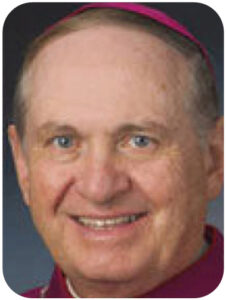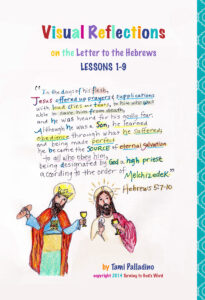focus on Scripture
“There is one particular way of listening to what the Lord wishes to tell us in his word and of letting ourselves be transformed by the Spirit. It is what we call lectio divina. It consists of reading God’s word in a moment of prayer and allowing it to enlighten and renew us.”
—Pope Francis
Turning to God’s Word Catholic Bible studies focus on Scripture by providing a gateway to lectio divina, the Church’s approach to  reading and praying about Scripture. Our studies are intended to lead participants to new ways of pondering what personal message God may be speaking to them, and to consider what actions God may be calling them to take in their lives. A sample appears on the directory for every full-length Turning to God’s Word Catholic Bible study, and you can link directly to lessons in Scripture and the Rosary: New Testament Mysteries, Old Testament Parallels, and during Lent Jesus’ Passion: The Story of Redemptive Suffering is available free online.
reading and praying about Scripture. Our studies are intended to lead participants to new ways of pondering what personal message God may be speaking to them, and to consider what actions God may be calling them to take in their lives. A sample appears on the directory for every full-length Turning to God’s Word Catholic Bible study, and you can link directly to lessons in Scripture and the Rosary: New Testament Mysteries, Old Testament Parallels, and during Lent Jesus’ Passion: The Story of Redemptive Suffering is available free online.
 applying lectio divina principles to Bible study
applying lectio divina principles to Bible study
In his apostolic exhortation Evangelii Guadium (Joy of the Gospel), Pope Francis offers practical suggestions for drawing closer to God through reading and praying with Scripture, including the following questions and some pitfalls that can stand in our way. You can access a number of other relatively recent church writings at ex libris—magisterial documents.
“Lord, what does this text say to me?
“What is it about my life that you want to change by this text?
“What troubles me about this text?
“Why am I not interested in this?
“Or perhaps: What do I find pleasant in this text?
“What is it about this word that moves me?
“What attracts me?
“Why does it attract me?
“When we make an effort to listen to the Lord, temptations usually arise. One of them is simply to feel troubled or burdened, and to turn away. Another common temptation is to think about what the text means for other people, and so avoid applying it to our own life. It can also happen that we look for excuses to water down the clear meaning of the text. Or we can wonder if God is demanding too much of us, asking for a decision which we are not yet prepared to make. This leads many people to stop taking pleasure in the encounter with God’s word; but this would mean forgetting that no one is more patient than God our Father, that no one is more understanding and willing to wait. He always invites us to take a step forward, but does not demand a full response if we are not yet ready. He simply asks that we sincerely look at our life and present ourselves honestly before him, and that we be willing to continue to grow, asking from him what we ourselves cannot as yet achieve.”
distinguishing features of Turning to God’s Word Bible studies
The questions in a Turning to God’s Word Catholic Bible study stay tethered to the biblical text, which is the cornerstone of keeping a focus on Scripture. This is a departure from a large number of Bible studies in which many of the questions focus on commentary instead of on the biblical text itself. Turning to God’s Word questions begin by examining who, what, when, and where, and the answers to these questions can be found by carefully reading the Scripture passages identified in the bold introductions to the questions. There are no trick questions, and there are no busy-work exercises that ask you to look up a large number of related passages that all say approximately the same thing.
Once the facts are established concerning what’s being described in the biblical text, questions become more subjective. “Why do you think that Jesus uses this kind of language?” “What point do you think it is that the prophet Isaiah is trying to get across?” There are many possible answers to such questions, and no one person’s opinion—no matter how scholarly—represents the only correct answer.
Many Turning to God’s Word study questions are even more personal, as in this example from Lesson 8 of Scripture and the Rosary: New Testament Mysteries, Old Testament Parallels about the Blessed Virgin  Mary’s visit to Elizabeth (found in the Gospel According to Luke 1:39–57): “Although Luke records only a small portion of conversation between the Blessed Virgin Mary and Elizabeth, the two women must have talked much more about God’s love during the three months they were together. What do you usually talk about when you spend time with your relatives and close friends? When was the last time that God’s love and mercy were the topics of your everyday conversation? What great things has God done for you?” (This section of Scripture and the Rosary: New Testament Mysteries, Old Testament Parallels is only available during the liturgical seasons of Advent/Christmas, but a set of Mysteries suitable to the liturgical season always is accessible.)
Mary’s visit to Elizabeth (found in the Gospel According to Luke 1:39–57): “Although Luke records only a small portion of conversation between the Blessed Virgin Mary and Elizabeth, the two women must have talked much more about God’s love during the three months they were together. What do you usually talk about when you spend time with your relatives and close friends? When was the last time that God’s love and mercy were the topics of your everyday conversation? What great things has God done for you?” (This section of Scripture and the Rosary: New Testament Mysteries, Old Testament Parallels is only available during the liturgical seasons of Advent/Christmas, but a set of Mysteries suitable to the liturgical season always is accessible.)
Turning to God’s Word authors are happy to discuss questions related to our studies. Communicating  directly with our readers can lead all of us to new insights. To ask a question about one of our studies, go to TtGW studies, choose the study that interests you, and click on the link to one of our supplemental lesson study pages, which include commentary and links to related resources as well as ask-us-your-question buttons that you can use to contact our authors. We’ll respond as soon as we can.
directly with our readers can lead all of us to new insights. To ask a question about one of our studies, go to TtGW studies, choose the study that interests you, and click on the link to one of our supplemental lesson study pages, which include commentary and links to related resources as well as ask-us-your-question buttons that you can use to contact our authors. We’ll respond as soon as we can.
approach the Bible as the living Word of God—We strongly encourage every participant in a Turning to God’s Word Catholic Bible study to watch The Bible as the Living Word of God, Matthew Phelps‘ video discussion of the practical benefits of Scripture study based on lectio divina. This inspiring talk, which explains the Catholic approach to Scripture in down-to-earth language that anyone can understand, was recorded during a retreat at Conception Abbey.
high-quality printed materials—Turning to God’s Word Catholic Bible studies have durable laminated covers, wire bindings so the pages lay flat, and cover flaps that can be used to mark your place. The inside pages are printed in color on heavy glossy paper. Every Catholic Turning to God’s Word study is carefully read by three or more professional editors and proofreaders. References to the Catechism of the Catholic Church and Scripture citations are diligently double-checked, and differences in the way chapters and verses are numbered in the Revised Standard Version Catholic Edition and the New American Bible Revised Edition are identified throughout the text as well as in the indexes.
imprimaturs—Every Turning to God’s Word Bible study is submitted to the authority of the  Catholic
Catholic  Church, and all of our studies have been granted an imprimatur by the Most Reverend William M. Joensen, Ph.D., (left), bishop of the Diocese of Des Moines, or by the Most Reverend Richard E. Pates (right), bishop emeritus. Those imprimaturs are your assurance our Bible studies have been thoughtfully reviewed by a designated representative of the Catholic Church to ensure that the work is free of doctrinal or moral error. In addition, Bishop Pates has written a foreword to Scripture and the Rosary: New Testament Mysteries, Old Testament Parallels. (Gregory Polan, O.S.B., (not pictured), abbot primate of Benedictines worldwide, has written the foreword to Sing a New Psalm: Communicating with God Through the Prayers of the Church—Volume I: Lauds & Vespers. He also was the lead translator for The Abbey Psalms and Canticles.)
Church, and all of our studies have been granted an imprimatur by the Most Reverend William M. Joensen, Ph.D., (left), bishop of the Diocese of Des Moines, or by the Most Reverend Richard E. Pates (right), bishop emeritus. Those imprimaturs are your assurance our Bible studies have been thoughtfully reviewed by a designated representative of the Catholic Church to ensure that the work is free of doctrinal or moral error. In addition, Bishop Pates has written a foreword to Scripture and the Rosary: New Testament Mysteries, Old Testament Parallels. (Gregory Polan, O.S.B., (not pictured), abbot primate of Benedictines worldwide, has written the foreword to Sing a New Psalm: Communicating with God Through the Prayers of the Church—Volume I: Lauds & Vespers. He also was the lead translator for The Abbey Psalms and Canticles.)
application—The introductions to lessons in Turning to God’s Word Catholic Bible studies include comments and questions that have been especially designed to foster thinking about ways the biblical text may apply to contemporary Catholic life.
religious art—Looking at religious art can reinforce and enhance our understanding of the 
 biblical text it depicts. Most Turning to God’s Word Catholic Bible studies include visual representations of scriptural scenes. Scripture & the Rosary: New Testament Mysteries, Old Testament Parallels features photographs of stained glass windows depicting scenes from the Rosary mysteries. The Revelation of Jesus Christ: The Faithful Witness, Sing a New Psalm: Communicating with God Through the Prayers of the Church—Volume I: Lauds & Vespers, and some lessons in In the Beginning: The Book of Genesis and You Shall Have No Other Gods: The Book of Exodus include Tami Palladino’s color illustrations. Tami also created “Right-Brain Reflections,” an online journal of her visual meditations based on The Letter to the Hebrews: An Explanation of the Mechanism of Our Salvation.
biblical text it depicts. Most Turning to God’s Word Catholic Bible studies include visual representations of scriptural scenes. Scripture & the Rosary: New Testament Mysteries, Old Testament Parallels features photographs of stained glass windows depicting scenes from the Rosary mysteries. The Revelation of Jesus Christ: The Faithful Witness, Sing a New Psalm: Communicating with God Through the Prayers of the Church—Volume I: Lauds & Vespers, and some lessons in In the Beginning: The Book of Genesis and You Shall Have No Other Gods: The Book of Exodus include Tami Palladino’s color illustrations. Tami also created “Right-Brain Reflections,” an online journal of her visual meditations based on The Letter to the Hebrews: An Explanation of the Mechanism of Our Salvation.
 vocabulary help—Turning to God’s Word Catholic Bible studies include boxes explaining the Greek, Latin, or Hebrew roots of key words in Scripture. Turning to God’s Word author Matthew Phelps writes weekly about translation issues. Links to past columns are included on our online study pages, which can be found under TtGW studies. We also maintain searchable online archives on our Lost in Translation page, where all of Matthew’s entries are posted, including the most current ones. If you’d like to receive Lost in Translation by email every Monday, you can sign use this link to let us know.
vocabulary help—Turning to God’s Word Catholic Bible studies include boxes explaining the Greek, Latin, or Hebrew roots of key words in Scripture. Turning to God’s Word author Matthew Phelps writes weekly about translation issues. Links to past columns are included on our online study pages, which can be found under TtGW studies. We also maintain searchable online archives on our Lost in Translation page, where all of Matthew’s entries are posted, including the most current ones. If you’d like to receive Lost in Translation by email every Monday, you can sign use this link to let us know.
indexes—A complete index of all Scripture citations and citations from the Catechism of the Catholic Church is included in the back of each Turning to God’s Word Catholic Bible study to make it easier to search for material about particular passages. A topical index is included as well.
papal & magisterial quotes—Quotations from recent popes and from magisterial documents are sprinkled throughout Turning to God’s Word Catholic Bible studies, offering participants access to comments about Scripture by some of the most deeply spiritual thinkers of our time.
lesson videos—Authors of our Catholic Bible studies record videos for each lesson, reading through the Scripture passages and explaining key points. You have free access so that you can watch them on your home computer at a time that’s convenient for you. You can access videos through our online lesson study pages on the study directories located under TtGW studies. Sing a New Psalm: Communicating with God Through the Prayers of the Church offers only an introductory video.
 supplemental online study pages—Turning to God’s Word Catholic Bible studies feature online resources for every lesson, including links to magisterial documents and additional commentary by the authors. To learn what’s been posted about a lesson, go to TtGW studies, select the directory for the Bible study that interests you, and scroll until you find the lesson you want. Each study page includes ask-us-your-question and what-do-you-think buttons that you can use to contact the authors.
supplemental online study pages—Turning to God’s Word Catholic Bible studies feature online resources for every lesson, including links to magisterial documents and additional commentary by the authors. To learn what’s been posted about a lesson, go to TtGW studies, select the directory for the Bible study that interests you, and scroll until you find the lesson you want. Each study page includes ask-us-your-question and what-do-you-think buttons that you can use to contact the authors.
other website resources—Don’t forget to check out the many other resources available on our website under study the Bible.
 we want to know
we want to know
Do you have a good idea about how Turning to God’s Word Bible Catholic studies can be even better? Share what you do to focus on Scripture when reading the Bible and praying. Contact us—we’d love to hear from you.
